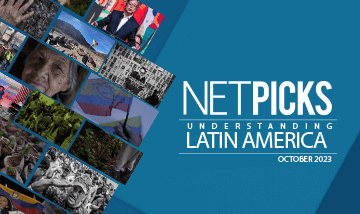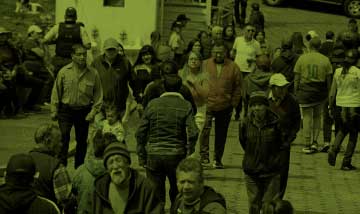Understanding Latin America
Dear readers and colleagues, this month we bring you five articles that reflect the reality of Latin America: one each from Colombia, Peru, Brazil, Guatemala and Chile.
- Colombia could elect first black female vice-president as poll leader names pick
- Peruvian stasis
- Brazil: Lula’s victory over lawfare
- Mining secrets: data leak reveals aggressive tactics of mining giant in Guatemala
- New constitution would declare Chile a plurinational state
.
COLOMBIA COULD ELECT FIRST BLACK FEMALE VICE-PRESIDENT AS POLL LEADER NAMES PICK
The May the 24th Colombian presidential elections are already remarkable in two ways. The country has never had a leftist president, but this time Gustavo Petro, a former mayor of Bogotá and ex member of the M-19 guerrilla movement, is leading the polls on behalf of the Historic Pact coalition. The governing party candidate and representative of former president Alvaro Uribe, is lagging far behind. The second unprecedented aspect of the campaign is Petro’s choice as his vice-presidential candidate: Francia Márquez, a black woman who hails from the conflict-ridden department of Cauca in the west of the country. An environmental activist, Marquez campaigned against illegal gold-mining mafias in her region, and later led a 10-day, 350-mile, march from the Colombian Amazon to Bogotá that led to the removal of the miners. Her efforts brought her both death threats and the 2018 Goldman Environmental Prize. However, it is her image as a representative of black people in Colombia that really marks her as unusual. Forming ten percent of the country’s 50 million population, Afro-Colombians are the descendants of slaves brought from Africa in colonial times, and are still a marginalized minority. One black activist said of Márquez’ candidacy that only a few years ago such a thing was unimaginable, and that while some laughed when she announced her campaign, her presence has now become a beacon for her people and will encourage more black women and girls to enter the political arena.
Joe Parkin Daniels, March 23rd, 2022. https://www.theguardian.com/world/2022/mar/23/colombia-francia-marquez-first-black-female-vice-president-candidate
.
PERUVIAN STASIS
When Pedro Castillo was elected president of Peru in 2021, his inaugural speech offered real hope for the country’s poor and marginalized sectors: i.e. those that had voted for him. The new president spoke of how colonialism had created a divided and unequal country, a division that continued to exist: oppressing and excluding the indigenous peasantry. Castillo’s mission was therefore to usher in an era of change. Unfortunately, the promise has not been fulfilled, but the reasons are not hard to identify. Owing his extremely small margin of victory to a divided anti-Fujimori movement with neither plan for governing or presence between elections, Castillo and his, “apparently ill-advised ministerial appointments” as the author puts it, have presented an easy target for a right wing opposition. The President’s economically progressive policies have consequently been put on hold, and his party’s and electorate’s socially conservative vision has come to the fore, for example implementing measures against Venezuelan immigrants and trans prostitutes. Castillo has also transformed his cabinet in an attempt to placate the opposition and avoid impeachment, and the group now has a distinctly center right aspect. While he did survive the latest impeachment vote on March 28th and may be able to continue for a period, according to the author he “lacks the competence and dexterity needed to weather the political storms that lie ahead”. Castillo’s original vision now finds itself in limbo, and without a major shift, his electorate and the country as a whole, will have to wait for much needed economic and social reforms.
Paulo Drinot, March 17th, 2022.
https://newleftreview.org/sidecar/posts/peruvian-stasis
.
BRAZIL: LULA’S VICTORY OVER LAWFARE
In 2017, in the context of the Lava Jato (Carwash) scandal, accusations of corruption were levelled against former president Lula da Silva. He was arrested in 2018, spent 580 days in prison, and was consequently unable to contest the presidential elections won by now president, Jair Bolsonaro. But on the 2nd of March of this year, Brazil’s Supreme Court dropped the 25th and last case against him; court justice Ricardo Lewandowski ruling there had been obvious bias against the former president. The Brazilian media was not neutral in the affair, says the author: “uncritically publicizing selectively leaked evidence and using sensationalist TV graphics of dollars thrown in the air as the studio background when reporting daily on developments.” However, times have changed, and media attitudes with them, although there seems little doubt that the shift has more to do with ‘dissatisfaction’ with Bolsonaro than any love for the former president, who now leads the polls for this year’s October 2nd vote. In part, Lula’s advantage is due to (unofficially) naming as his vice-presidential candidate Geraldo Alckmin, a former governor of São Paulo State and key member of the center-right Social Democratic Party of Brazil (PSDB). The choice seems to have found widespread acceptance, while being criticized from the left. The pair’s political platform has also not been officially announced, but according to sources the environment and the Amazon will be amongst the top priorities, together with the rights of Indigenous peoples.
Alistair Clark & Alvaro Crósta, March 21st, 2022.
https://lab.org.uk/brazil-lula-the-victor-of-lawfare/
.
MINING SECRETS: DATA LEAK REVEALS AGGRESSIVE TACTICS OF MINING GIANT IN GUATEMALA
The Swiss based Solway Group, owners of the Fénix mine in El Estor, Guatemala, has been accused by communities affected by the mine’s activities of wielding its money and power to influence decisions. Activity at the mine had been suspended since February 2021 for failing to sufficiently consult local communities on environmental and social concerns, but on January 6th of this year, the company was allowed to resume extraction after the Guatemalan Ministry of Energy and Mines (MEM) signed a resolution in its favor. The decision followed a consultation between the Guatemalan government, El Estor community leaders, and representatives of Solway: a process praised by the Ministry but considered flawed by community leaders. A massive data leak has now provided insight into just how this secretive multinational operates in its attempts to ‘manage’ the local communities’ protests. Behind the scenes, say the authors, Solway was operating through a foundation almost entirely financed by its subsidiaries, donating money to community leaders involved in the consultation since at least October 2020, one year before the process even started. The company denies any wrongdoing, but a report based on leaked documents and e-mails appears to confirm the suspicions of the community members that Solway has not exactly been playing by the rules.
Phineas Rueckert and Paloma Dupont de Dinechin, March 6th, 2022.
https://forbiddenstories.org/mining-secrets-data-leak-reveals-aggressive-tactics-of-mining-giant-in-guatemala/
.
NEW CONSTITUTION WOULD DECLARE CHILE A PLURINATIONAL STATE
Chile’s Constitutional Convention consists of 155 members – half men and half women, with 17 indigenous members – all elected by popular vote in October 2020. On July the 4th, 2021, the Convention began debating and drafting the country’s new constitution and has until July the 4th of this year, to finish its work. One of the most interesting developments of the work so far, has been the approval on February the 17th of a new definition of Chile as a regional, plurinational, and intercultural State. The proposal now forms part of the draft constitution that Chileans will vote to approve or reject in an August or September 2022 referendum. The measure is of major importance for the country’s indigenous peoples, who as per the country’s 2017 census, formed 12.8 percent of the Chile’s 17.07 million inhabitants, or 2.18 million people. According to Domingo Namuncura, an indigenous Mapuche social worker and professor at the Catholic University of Valparaíso, “Chile has always been plurinational because it is constituted on the basis of different native populations that were already in this territory and that joined as native peoples or nations, by force or otherwise, in the construction of the national State.” Unsurprisingly not everyone agrees with the Convention’s work; business leaders accuse the Convention of reflecting minority viewpoints and “distancing itself from the real Chile and from the work for a constitution for all.”
Orlando Milesi, March 9th, 2022.
https://www.ipsnews.net/2022/03/new-constitution-declare-chile-plurinational-state/
NOTE: The author states that Bolivia is the only country in Latin America presently defined as ‘plurinational’; however, the Ecuadorian Constitution of 2009 also defines that country as ‘intercultural and plurinational’.




